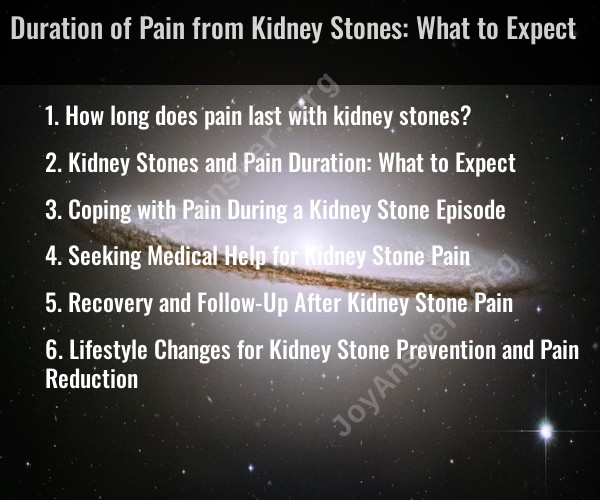How long does pain last with kidney stones?
The duration of pain from kidney stones can vary widely from person to person and depends on several factors, including the size and location of the kidney stone, the individual's pain threshold, and the effectiveness of pain management strategies. Here's what you can generally expect:
Passing Small Stones: Small kidney stones (usually less than 4 mm in diameter) may pass through the urinary tract without causing significant pain or may cause mild to moderate pain for a short duration. This pain can last anywhere from a few minutes to a few hours, especially during the stone's movement through the ureter.
Larger Stones: Larger stones can cause more intense and prolonged pain. The pain is often described as severe and may come in waves as the stone moves within the urinary tract. The duration of pain can range from a few hours to a few days.
Stones That Require Medical Intervention: Some kidney stones are too large or cause a blockage that requires medical intervention. In such cases, the pain can persist until the stone is removed or treated. Medical procedures, such as lithotripsy, ureteroscopy, or surgery, may be necessary to address these stones.
Recurrent Pain: In some cases, individuals may experience recurrent episodes of kidney stone-related pain if they are prone to forming stones. These episodes can occur intermittently over time.
Pain Management: Pain from kidney stones is often managed with pain medications, such as non-steroidal anti-inflammatory drugs (NSAIDs) or prescription pain relievers. Effective pain management can help make the experience more bearable.
It's important to note that while kidney stone pain can be severe, it usually ends once the stone has passed or been treated. However, the discomfort and pain can be intense during the process. If you suspect you have a kidney stone or are experiencing severe abdominal or back pain, it's crucial to seek medical attention promptly. A healthcare provider can diagnose the condition, provide appropriate pain relief, and recommend the most suitable treatment based on the stone's size and location. Kidney stones left untreated or unmanaged can lead to complications and further pain.
Kidney Stones and Pain Duration: What to Expect
The pain from a kidney stone can last anywhere from a few hours to a few weeks. The size and location of the stone, as well as the individual's pain tolerance, will all affect the duration of the pain.
In general, smaller stones are more likely to pass on their own and cause less pain. Larger stones may require medical intervention to pass.
Coping with Pain During a Kidney Stone Episode
There are a number of things you can do to cope with pain during a kidney stone episode, including:
- Over-the-counter pain relievers. Nonsteroidal anti-inflammatory drugs (NSAIDs), such as ibuprofen or acetaminophen, can help to reduce pain and inflammation.
- Prescription pain relievers. In some cases, your doctor may prescribe stronger pain relievers, such as opioids.
- Drinking plenty of fluids. Staying hydrated can help to flush the stone out of your system.
- Applying heat to your back or abdomen. Heat can help to relax muscles and relieve pain.
- Taking a warm bath or shower. This can also help to relax muscles and relieve pain.
Seeking Medical Help for Kidney Stone Pain
If you experience severe pain, nausea, vomiting, or fever, you should seek medical attention immediately. These may be signs of a more serious medical condition, such as a kidney infection.
Your doctor may recommend a variety of treatment options for your kidney stone, including:
- Medications. Medications can help to relax the muscles in your ureter, making it easier for the stone to pass.
- Lithotripsy. Lithotripsy is a procedure that uses shock waves to break up the stone into smaller pieces that can pass more easily.
- Ureteroscopy. Ureteroscopy is a procedure that uses a thin, flexible tube with a camera and laser at the end to remove the stone.
Recovery and Follow-Up After Kidney Stone Pain
Once the kidney stone has passed, you may experience some discomfort for a few days. This is normal.
Your doctor may recommend that you see a urologist for follow-up care. The urologist can check to make sure that the stone has passed completely and can also recommend lifestyle changes to help prevent future kidney stones.
Lifestyle Changes for Kidney Stone Prevention and Pain Reduction
There are a number of lifestyle changes you can make to help prevent kidney stones and reduce pain from future kidney stone episodes, including:
- Drink plenty of fluids. Aim to drink at least eight glasses of water per day.
- Eat a healthy diet. Eat a diet that is low in salt, animal protein, and processed foods.
- Maintain a healthy weight. Excess weight can increase your risk of developing kidney stones.
- Avoid smoking and excessive alcohol consumption. Smoking and excessive alcohol consumption can also increase your risk of developing kidney stones.
If you have any questions or concerns about kidney stones, please talk to your doctor.












